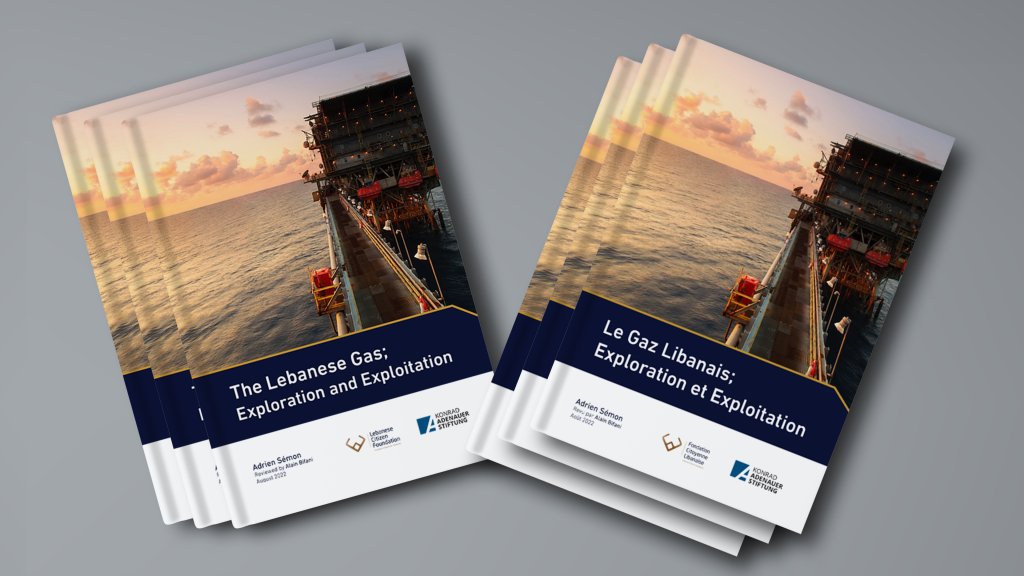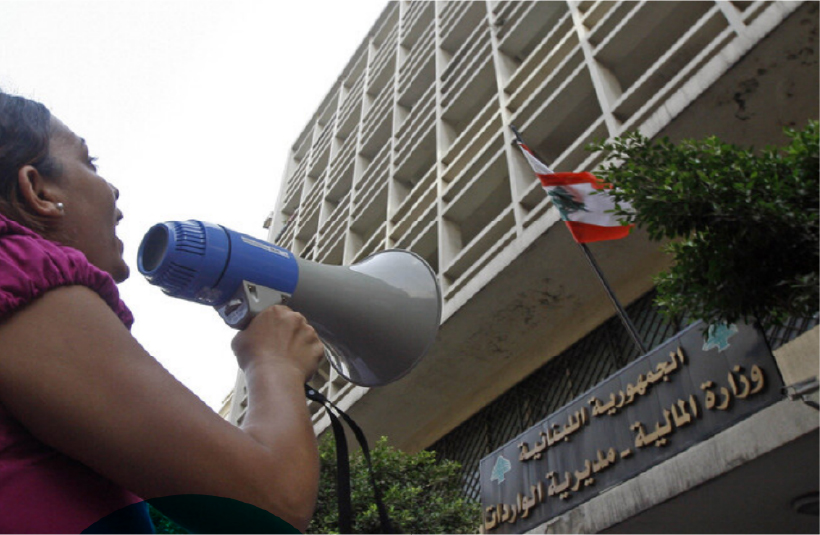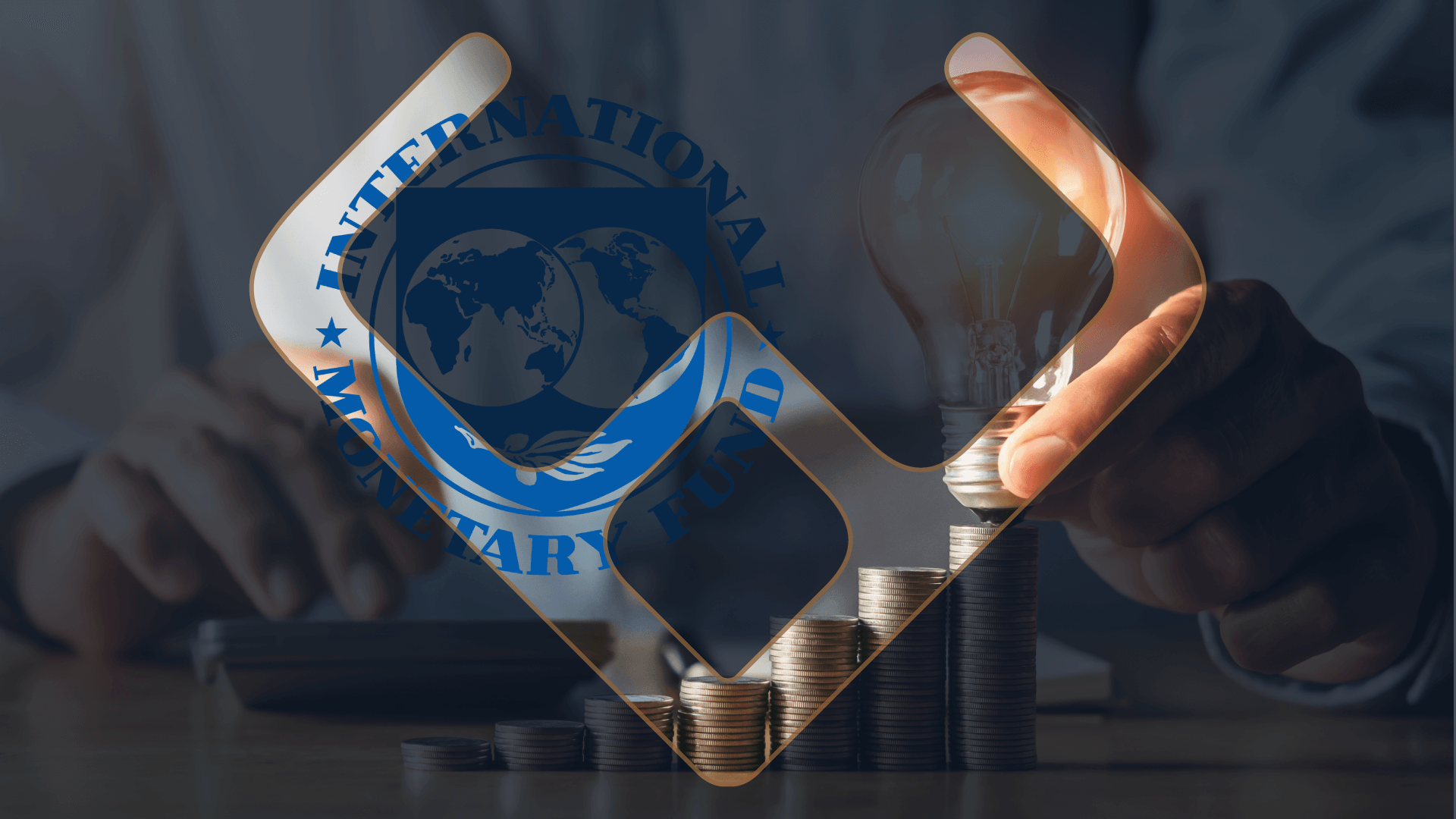The Lebanese
Citizen Foundation
Konrad Adenauer Stiftung
&
LEBANON
A New Mission,
A New Development Model
Pr. Ghassan Salame Amb. Pierre Duquesne
Ms. Sibylle Rizk Ms. Diana Abbas
Alain Bifani
- Lebanon in a deadlock, seeking a role and solutions
Lebanon is currently witnessing a collapse of an unprecedented magnitude, and is enduring a multi-faceted crisis affecting all life aspects, underlining the end of the existing political and economic systems established decades ago. This situation is creating an existential dilemma and is exacerbating the gradual disintegration of the main public functions and the disruption of basic services. It is also calling for a new and modern system, based on citizenry, equality, law and order, and efficiency. Lebanon should opt for a new development model that is inclusive, fair, and sustainable, and this model will rely on the competitive advantages that exist or that need to be developed. On this specific topic, Pr. Ghassan Salame was asked to highlight the strengths of Lebanon in its environment, as well as the immediate constraints the country faces on the road toward the above-mentioned new model.
Although aggravated by regional instability and by the Covid-19 pandemic, the crisis finds its roots in structural and inherent drawbacks related to a dysfunctional state captured by an oligarchic power system. The latter leads to political paralysis, lack of accountability, systemic corruption and unsustainable governance. This is why the Citizen Foundation’s event on May 26, 2021, asked Ms. Sibylle Rizk, director of public policies at Kulluna Irada, to explicit the set of policies that a new government should prioritize in an effort to proactively find solutions to the crisis, gain popular support, and move away from the existing dysfunctional state and take Lebanon toward modernity.
The cumulative effects of the wrong practices listed hereabove resulted in an unprecedented economic collapse, with a historical fall in gross domestic product, a catastrophic deterioration of the national currency which has already lost more than 90 percent of its value, and major social upheavals as the country is witnessing a free fall into mass poverty with skyrocketing inflation. Under such circumstances, the Citizen Foundation wanted to listen to Ms. Diana Abbas, a co-founder of Impact Lebanon and based in the UK, on the various initiatives the latter is leading for Lebanon, and therefore have a sense of the diaspora’s present and potential contribution.
On the other hand, the official reaction to the dire situation has clearly been totally inappropriate, way below internal and international requirements, with the public authorities deliberately adopting a do-nothing-policy which results in an unsustainable and unfair distribution of the losses accumulated in the system throughout decades because of inadequate economic, monetary and fiscal policies. Thus, the Citizen Foundation’s conference featured a legitimate international figure, Ambassador Pierre Duquesne – in charge of coordinating international support for Lebanon – who detailed an ideal roadmap that would insert the country again in the group of the enviably well developing ones, and beyond the usual international requirements.
Today, while various opposition groups have yet to find ways to collaborate and put forward a viable and efficient alternative, the political system is facing a severe lack of confidence. Its legitimacy is being questioned and a sizeable part of the population is rejecting the status-quo and refuses to adhere to a failed system. Alain Bifani, the president of the Lebanese Citizen Foundation, announced the death of the existing system and called for a swift transition toward a modern one, warning against any attempt to maintain the existing, as it is no longer able to bring any solution to the Lebanese acute and multifaceted crisis.
- Mission of the Citizen Foundation
At the Citizen Foundation, we engage with all stakeholders. We are able to mobilize an impressive group of experts to contribute to our work, and to reach the top level of many countries and institutions, based on our credibility and on each member’s track record.
Though we can act as facilitators, we have our strong beliefs and we fight for our values. The Foundation’s remarkable network serves the purpose of promoting sound policies and fair choices, and relies on prominent figures and people on the ground.
The Citizen Foundation has its roots in Lebanon and is present worldwide. It can build on unique expertise, including the one of the public sector in Lebanon through colleagues who have a solid experience in the public administration and international institutions.
The Foundation’s work is impactful at the highest levels.
- Aspiration towards a new model
Despite the gravity of the situation and the depth of the problem, Lebanon presents several strengths in which it can invest to build a better future for the coming generations. Pr. Salame pointed to many major structural strengths related to Lebanon’s geographical position and human capital with entrepreneurial drive. He emphasized this should be encouraged to overcome the present exceptional crisis. The same human capital was considered by Ambassador Duquesne as the main pillar on which Lebanon can rely on the path to ambitious alternatives, and not just settle for basic solutions. On the other hand, Ms. Abbas referred to the exceptional potential the Lebanese diaspora can put at the service of residents to help them improve their living standards instead of being pushed to emigrate.
Building on Lebanon’s inherent strengths, Mr. Bifani emphasized that times of crises are times of opportunity as well, and that Lebanon had a chance to achieve change, especially that the established system’s fundamentals are at their weakest. It is imperative, he said, to take advantage of the ‘reset’ situation to build a promising future.
Amid global challenges related to technology, health and environment, and despite unfavorable regional and international conditions, Lebanon should ideally take the lead to stop the economic and social free-fall and to create a new development model based on well designed public policies tailored to serve clear pre-defined purposes. This new model is supposed to constitute a reliable alternative in terms of policy making to better respond to the current challenges, and therefore form a comprehensive work program for serious governments.
The desired model uses critical and strategic thinking to promote values related to good governance, political participation, accountability, innovation, economic development and financial inclusion. Pr. Salame focused on the importance of enhancing citizenry and the role of institutions as a crucial step facing the fallout of sectarianism in terms of corruption and lack of accountability. Ms. Rizk added the need to overhaul the political system to move towards a modern state relying on social equity and economic efficiency while adopting a civil code both at the level of political and personal status, to be able to react properly to the economic and social emergency. Ms. Abbas raised the urgency to put in place a set of ruling values for the suggested new model, including justice, integrity and transparency as well as higher consideration for the human rights and the environment. As for Ambassador Duquesne, he insisted on sustainable development as a main pillar of the new model to allow Lebanon to keep pace with the international community in its path towards the implementation of the United Nations development goals.
Building a better model requires a good understanding of the Lebanese strengths and weaknesses in order to customize the most suitable and efficient solutions, and move towards stronger citizenry which entails a strong sense of belonging, away from clans and religious groups.
In this regard, Ghassan Salame insisted Lebanon can tap into several advantages in order to launch its development process.
- The geographical advantages in relation with the strategic location at the confluence of different continents with easy access to both Europe and the Arab world, constituting a major boost for several sectors such as communication, travel, tourism, services and also potentially facilitating the development in industries and agriculture. Also, the geographical strengths include the existing natural resources (mainly water, and potentially oil and gas) that should be exploited in the most efficient manner to help the sustainable development process. Alain Bifani stressed that, if exploitable, petroleum assets should be preserved as financial assets, and only the revenue generated by them should be partly or fully used in the budget, as to avoid their quick depletion or a Dutch disease scenario.
- The entrepreneurial drive of the Lebanese population, well-known for its high motivation and perseverance, its tendency to take initiatives and innovate with a relatively low risk aversion. This work culture is crucial to thrive in business and create new opportunities despite the unfavorable conditions, and can be a major bloc in building a production-based economic model where human capital is a key variable and a critical input in several sectors such as information technology as well as cultural and entertainment production.
- The widespread and active diaspora across the world, which constitutes a strong leverage for Lebanon not only in terms of financial transfers, but also in acting as a solid support for change initiatives and creation of opportunities for resident Lebanese citizens whether professionals or students. The engaged diaspora is motivated by a set of values related to non-sectarianism, inclusiveness, integrity, justice, transparency, human rights, active citizenry, civic engagement and environmental awareness, all of which are crucial in building a new Lebanese model that is able to keep pace with the international development trends. The motivation for such a new model among the diaspora has materialized in the form of several initiatives that emerged after the uprisings in October 2019. These initiatives use several ways to involve Lebanese non-residents in understanding the needs and supporting change. Many of these initiatives took the form of a concrete help, providing aids (especially after the Port explosion in August 2020) or opportunities for residents – promoting Lebanese products, designs and workforce abroad, as detailed by Ms. Abbas. Other initiatives focused rather on a longer-term change within the society, by promoting a more engaged and informed citizenship, as well as increasing awareness related to multiple issues ranging from environmental challenges to dialogue and acceptance culture.
In contrast, Ghassan Salame underlined, Lebanon suffers from some inherent drawbacks that must be addressed in order not to hinder the development process.
- The individualistic mindset widely spread in Lebanon, with a gross preference for the personal interest over the common public good, and this has clearly reached many public officials in charge for the past decades. At this level, building a common sense of belonging and a citizen culture is key to create common goals for the different groups and factions in order to motivate individuals to pursue public interest.
- The weakness of existing institutions, the lack of clear standardized procedures and the low productivity at the level of all sectors whether political, financial, judicial, educational or else. For instance, Lebanon’s judiciary system suffers from political interference through politically-motivated appointments or clan affiliation, and lacks capacity due to vacancies or inappropriate skills. The legislative body represents the clans instead of representing the people, and its control over the executive power is practically non-existent, as the same heads of clans control both. And ministers do not abide to any law or control, since the system decided that only a parliamentarian court can sue them, even if they are convicted of wrongdoing. Reforms are much needed in this regard as institutions are a building bloc in strengthening the sense of belonging to the state instead of belonging to sectarian factions. The said factions have historically benefited from the weak institutional environment to thrive and attract followers and eventually, they succeeded in substituting themselves to the State in many of its basic tasks. This resulted in a major disruption of all forms of accountability at the level of public administration leading to widespread corruption. Addressing such a prevalent issue must be done through a clear road map to eliminate political sectarianism starting with the public administration and the executive authority all the way down to the legislative authority, recommended Pr. Salame. This is likely to happen through challenging several aspects of the current political system that has proven to be impeding the move towards a modern State. Ghassan Salame deemed the suppression of sectarianism as urgent and must be addressed without delays as it is not compatible with citizenry that constitutes a building bloc in the modern State. On a different note, Sibylle Rizk considered the formation of a transitional government as the primary step to start implementing the required change by organizing proper elections and restoring legitimacy. Ambassador Duquesne touched on the critical subject of decentralization as an option to be considered in Lebanon and stressed on the need for new laws in order to restore the international confidence.
- Road map to move forward
Facing the failure of the existing model, Lebanon must opt for a comprehensive approach to stop the accelerating economic and social deterioration on the short term from one side, and to move towards a better and a more sustainable development model on the long term.
As stated by Ms. Rizk, the losses accumulated within the system are likely to reach about two times Lebanon’s gross domestic product, the latter witnessing a record free fall from around US$ 50 billion to an estimated US$ 20 billion during the current year. As a result, GDP per capita is back to its level during early 1990s, and the poverty level has reached more than half of the population with 3/4 of households living with the equivalent of US$ 200 per month, as 2/3 of the Lebanese workers being paid in local currency despite a massive depreciation of about 90%.
On the short term, actions are needed at the political and economic levels to stop the free-fall and restore confidence.
In fact, the lack of trust in the existing political authorities is mirroring a systemic political crisis that cannot be addressed without a thorough renewal at this level to help regain legitimacy. Such a change would allow the establishment of a modern State based on 3 main pillars: (i) social equity and economic efficiency, as opposed for instance to the biased distribution of the central bank’s and banking sector’s accumulated losses at the expenses of the less fortunate through hyperinflation (150%), when depositors are the ones bearing the losses instead of shareholders; (ii) enhanced citizenry at various levels, and (iii) restored sovereignty.
On the economic level, an action plan must be put in place on the short term in order to address the different aspects of the crisis based on (i) a clear evaluation of the financial sector’s losses through a complete and independent audit performed at the level of the central bank and the financial institutions, (ii) capital controls implementation to prevent additional foreign exchange leakage, and (iii) a determination of the available liquidity resources in order to better design adequate fiscal policies on the medium term. These steps are pre-requisites to envisage serious negotiations with the international community, be it the International Monetary Fund or other international lenders. Several economic choices should be quickly made, mainly those related to the unification of the exchange rate, the restructuring of the central bank and the banking sector, a new subsidies policy in view the existing means and the need to protect the most vulnerable, including small depositors, and to ensure a medium to long term economic and monetary stability.
On the other hand, the long-term action plan to be implemented should aim for sustainable development and be based on the internationally agreed goals adopted by the United Nations. In this regard, Lebanon must work on several fronts, as preconized by Ambassador Duquesne, in order to ameliorate the living standards and ensure equal rights and opportunities for all its citizens. This would help Lebanon move towards a more sustainable model where citizens can rely on better social benefits related to health, education, housing or else.
- Governance issues (in line with SDGs # 5, 12, 16, 17)
Given the large needs at this level, Pierre Duquesne underlined several reforms that can be put in place:
- ensuring women’s full and effective participation in the political, economic and public life, as the gender-based discrimination is embedded in many laws and social norms in Lebanon as noted by the “social institution and gender index” released by the OECD;
- promoting sustainable public procurement practices through a legal reform in order to enhance transparency and market sustainability;
- promoting peaceful and inclusive societies by establishing the rule of law (ensuring the independence of the judicial authority), reducing corruption, enhancing the efficiency and the transparency at the institutional level, and ensuring public access to the information as well as protecting fundamental freedoms;
- encouraging effective public, public-private and civil society partnerships;
- supporting positive links between urban, peri-urban and rural areas by strengthening national and regional development planning, with a consideration for the level of decentralization required.
- Social issues (in line with SDGs # 1, 3, 4, 10)
At this level, several reforms might be adopted, he said, including:
- the implementation of social protection measures much needed at the time of crisis especially in terms of health and education, especially that the share of expenditures related to these essential services is at very low levels with 8% to 9% for the education and 13% for the health sector in contrast with a share of 38% from total expenditures being allocated to the debt service, as noted by the ambassador;
- the instauration of a universal health coverage;
- the spread of the technical and vocational education to be more in line with the market needs and eventually reduce the reliance on the external workforce;
- the increase in the welfare of the most vulnerable by ensuring a higher growth rate of their income compared to the national average, through efficient distributional policies;
- the facilitation of migration to and from Lebanon in an orderly and safe manner. Despite being a critical subject, this issue should be addressed through adequate laws and policies to ensure the country maximizes its benefit from the incoming and outgoing flux of migration, knowing that Lebanon has historically received a high flow of capital from workers abroad (around US$ 7 billion yearly, i.e. between ¼ and 1/3 of its GDP).
- Environmental issues (in line with SDGs # 6, 11, 12, 13, 14, 15)
Given the multitude of environmental challenges facing Lebanon, many policies should be considered at this level in order to ameliorate the living standards of the population and ensure sustainability.
- Planification is crucial in the water supply sector in order to ensure public access to drinking water with reasonable costs;
- Waste management and air pollution are some of the most important challenges to be addressed especially that Lebanon has a long way forward in terms of solid waste treatment. An important indicator to be taken into consideration in this regard is the ratio of urban solid waste collected regularly, with Lebanon producing about 1.5 million tons per year without having a comprehensive plan to reduce this level;
- The access for all to safe and affordable housing and basic services should be at the core of public policies that are still not prioritized by the Lebanese authorities, even though they gained some interest after the Beirut port explosion, with increasing needs to rebuild the damaged areas in a more social considerate way;
- The integration of different measures related to combatting climate change (e.g. measures promoting green finance) and maritime pollution in public policies and strategies, as Lebanon has a responsibility to contribute to a better environment at the global level.
- Economic issues (in line with SDGs # 2, 7, 8, 9, 11, 12)
At the economic level, the instauration of a new model should be based on a shift towards a more equitable and production-based economy, with several policy issues to be addressed.
- Increasing the productivity in the industrial sector and its contribution to national production (GDP) in a sustainable manner, with a special focus on food production and supply chains as these products are gradually substituting one part of Lebanese imports; this can be achieved through a set of policies aiming to ensure a better financing for the small and medium industrial businesses, and to guarantee them access to a reliable, modern and affordable energy supply;
- Promoting policies to increase the share of renewable energy in the total energy production, in order to reduce reliance on fuel imports from one side and ensure a more environmentally friendly source of energy on the other side;
- Developing a reliable infrastructure including large cross-border projects that help Lebanon to better interact with its surrounding and facilitate regional trade,;
- Providing access for all to a safe and affordable public transportation service;
- Increasing access to information and communication technologies, noting that Lebanon has a major strength in this regard in terms of human capital;
- Implementing policies that promote job-creating sectors in which Lebanon has a comparative advantage such as sustainable tourism and cultural production.
- Financial issues (in line with SDGs # 8, 10, 17)
Following the current financial crisis, Pierre Duquesne said double efforts are needed to restore confidence and achieve progress at this level. Policies needed should aim to build a sustainable financial system that avoids the previous downfalls.
- Reforms are much needed in the banking system to restructure the sector and recapitalize the remaining financial institutions, therefore ameliorating their capacity to offer better and more accessible financial services to all;
- Enhancing regulations and supervision of financial markets is crucial to prevent another banking crisis driven by excessive public or private indebtedness;
- Policy choices should also address the most suitable exchange rate regime to be adopted with what it entails in terms of flexibility for the monetary policy;
- In terms of fiscal policy, the available options deal with revenue mobilization, enhancement of fiscal compliance and reducing tax fraud, the level of taxes compared to GDP, the tax composition (direct or indirect taxes, weighing on households or businesses);
- Debt sustainability is another crucial subject to be addressed by the public policies, with the urgent need for a renegotiation and debt restructuring in the case of Lebanon.
- A bankrupt country but not yet a totally failed State?
On this, contributors did not agree, as some considered Lebanon to have reached the status of a failed state.
Given the depth and the ramifications of the crisis Lebanon is currently undergoing, solutions cannot be simplistic nor temporary. The public policy debate should deal with major issues related to the role of the State, globalization, fiscal and monetary policy, exchange rate regime, social protection, housing policy, renewable energy alternatives, environmental challenges, etc.
With such complex subjects on the table, the Lebanese Citizen Foundation is aiming to make a change in terms of public policy reforms and study-based decision-making processes. It is tapping into local and international expertise to provide policy alternatives and a well-designed development model for the Lebanon-to-be. Based on the content of the interventions on May 26, the Citizen Foundation calls for:
- A deep change in the political system, as the existing one is strongly tied to the economic system that has collapsed;
- Moving towards a new system based on citizenry rather than sectarianism;
- Promoting a higher level of governance by establishing legal and administrative procedures that ensure ministers’ accountability, transparency and equal chances of participation for marginalized categories;
- Restructuring the banking system, including the Banque du Liban, and clean it from wrongdoers;
- Unifying the exchange rate to allow the productive sectors in Lebanon to bounce back;
- Adopting long term and sustainable policies that promote sustainable economic development, lower inequalities, social cohesion, and environment protection.






